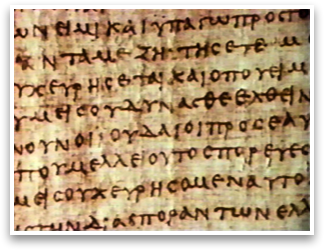
The New Testament
If you've ever heard someone called a "Good Samaritan" or been encouraged to follow the "Golden Rule," then you've been influenced by the New Testament. Written nearly 2,000 years ago, the New Testament (along with the Hebrew scriptures, commonly called the Old Testament) make up the collection of books commonly known as "The Bible," a name itself that simply means "Book."
The New Testament deals with the birth, life, history, death, and influence of Jesus of Nazareth. In addition to the gospels, which deal directly with Jesus and his teachings, the New Testament contains the history of the early church (Acts) as well as letters preserved by the church that deal with a host of theological and ethical issues. The New Testament ends with an apocalyptic book (Revelation), which is a series of visions dealing with eschatology (the last things).

Themes and Facts
- The New Testament was composed in the mid to late first century. It consists of 27 books that are commonly agreed upon by all major Christian groups.
- All of the New Testament was written in Greek, specifically Koine Greek, which was a common dialect Greek used between 300 BC and 300 AD.
- The New Testament canon was finalized by the mid-4th century A.D. through a series of representational church councils.
- For the NT canon, the guiding criterion for admission was apostolic authority (i.e. was the book written or endorsed by an apostle or someone in a position of authority in the early church).
- The NT consists of gospels (theological biographies of Jesus), history (Acts), letters, and apocalyptic materials (Revelation).
Study Questions
- What different emphases do you notice amongst the different gospels? Remember that Matthew, Mark, Luke, and John all wrote for specific audiences and had particular themes and emphases in mind.
- Why did Jesus teach in parables? What is it about parables that lend themselves to ethical or moral teaching?
- Why was Jesus condemned to death? How did he offend both the Jewish and Roman authorities?
The Bible is the single most influential book in existence. It is the most widely-translated book ever and is perennially the best-selling book on the planet. It has influenced poets, novelists, philosophers, theologians, musicians, artists, and a few cult leaders here and there. Its influence is felt everywhere from “The Simpsons” to Handel’s “Messiah.” Authors as diverse as Aligheri Dante, William Shakespeare, John Milton, Flannery O’Connor, Saul Bellow, and Cormac McCarthy demonstrate its continued influence. From Seinfeld to Superman, the Bible has made an indelible mark on culture.